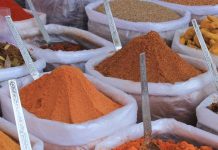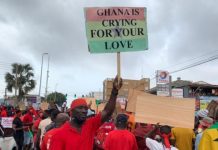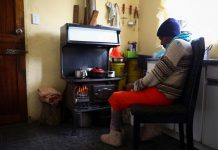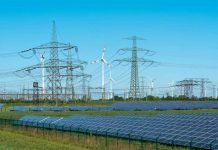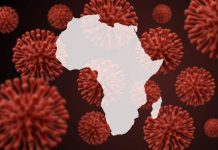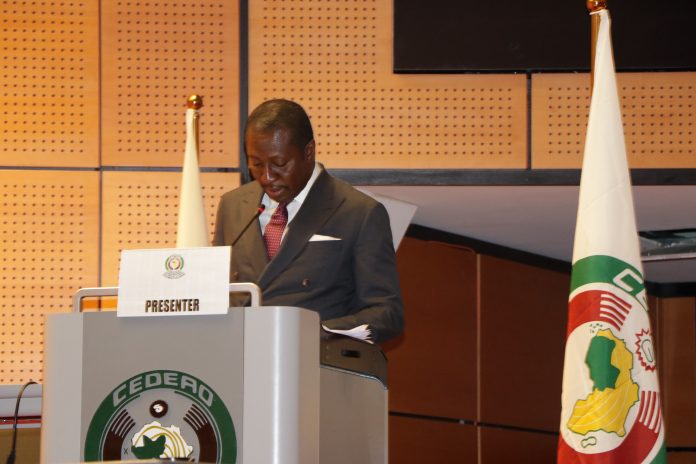Ghana’s delegates to the ECOWAS Parliament have revealed some of the country’s economic reforms in recent times.
The Hon Alexander Kwamena Afenyo-Markin-led eight-member delegates said President Nana Akufo-Addo has introduced new taxes to mobilize revenue and mitigate the dire effects of the aforesaid developments on the economy.
They, however, revealed that some of the policies were welcomed with stern resistance by labour unions.
They made this known in their country report to the ECOWAS parliament.
“The year 2022 began with a generally calm political situation. There were, however, some agitations by public sector workers over the annual minimum wage increment for 2022. There were also agitations by various labour unions over poor conditions of service; a surge in fuel prices, and challenges in the global supply chain resulting in high import and export costs,” the report said in part.
“Like many other countries across the globe, Ghana has not been spared the adverse economic impact of the COVID-19 pandemic and recent global developments. The Government of Ghana has implemented new economic policies including the introduction of new taxes to mobilize revenue to mitigate the dire effects of the aforesaid developments on the economy. The introduction of the electronic transaction levy (e-levy), (tax imposed on some electronic transactions) generated public uproar in the social and mainstream media. Although the social media campaign threatened to degenerate into widespread street protests, the Government succeeded in averting such incidents by engaging the citizenry and relevant stakeholders on the need for the new taxes”.
Read full report below:
1.0 INTRODUCTION
Mr. Speaker, I have the pleasure to present on behalf of Ghana’s delegation, our Country report covering the following thematic areas:
- Political and Security Situation ii. Human Rights Situation
- Health Situation with emphasis on the evolution of COVID-19 pandemic
- Status of Implementation of Community Texts namely:
- The Protocol relating to the Community Levy
- The Protocol on Free Movement of Persons and Goods
- The Supplementary Act on Equality of Rights between Women and Men for Sustainable Development in the ECOWAS Region.
2.0 POLITICAL AND SECURITY SITUATION
The political and security situation in Ghana has been relatively calm despite some incidents of national security concern. These incidents include chieftaincy disputes and ethnic conflicts, threats of terrorism and violent extremism, piracy in the Gulf of Guinea, activities of secessionist groups and political and socioeconomic developments. However, the Security and Intelligence Agencies in Ghana, in collaboration with Ministries, Departments and Agencies, adopted measures that helped mitigate the aforementioned threats.
2.1 Chieftaincy Disputes and Ethnic Conflicts
Tensions owing to land and chieftaincy disputes in northern Ghana and some parts of the coastal areas have been prominent. There were isolated cases of gun attacks in those places in the first quarter of the year, underscoring the need to intensify security in the affected areas. Consequently, the Government, through the relevant security agencies, instituted the following measures:
- Joint patrols by the Ghana Police Service and the Ghana Armed Forces in affected areas.
- Deployment of additional personnel and armoured vehicles to beef up security in the affected areas.
- Investigations into the shooting incidence for the arrest and prosecution of the offenders.
- Enhance efforts of the security agencies to intercept illegal arms and ammunitions.
Additionally, the National House of Chiefs, a body set up to mediate chieftaincy-related issues, continues to engage feuding factions and relevant stakeholders to amicably resolve some of the protracted land and chieftaincy issues.
2.2 Threats of Terrorism and Violent Extremism
Although Ghana has not recorded a terrorist attack, the recent surge in terrorist activities in neighbouring countries, particularly Burkina Faso, Togo, Mali, Niger, and Nigeria, places the country at risk. In the past year, the Ministry of National Security stepped up its counter-terrorism efforts to avert any terrorist attacks particularly on the Northern frontier, bordering Burkina Faso, due to the prevailing security situation in that country.
Reports of terrorist-related activities in Ghana were rife in 2021 and the early part of 2022. There have been recent indications of plans by terrorist and extremist groups in the Sahel region to expand their activities southwards to countries along the Gulf of Guinea. The northern part of the country faces the highest risk of terrorist infiltration in view of its proximity to landlocked West African countries which are grappling with activities of terrorist and extremist groups. Their modus operandi is to recruit fighters from target countries and train same.
The Government of Ghana through the Ministry of National Security, continues to adopt the following measures aimed at effectively dealing with the threats of terrorism:
- Intensification of ongoing counter-terrorism operations along the various frontiers of the country
- Implementation of Ghana’s Framework for Preventing and Countering
Terrorism and Violent Extremism
- Retooling of the various State Security and Intelligence Agencies
- Adoption of the ‘soft options’ approach by expediting development and providing employment for the youth, particularly, those in vulnerable border communities.
2.3 Piracy in the Gulf of Guinea
The Gulf of Guinea, where Ghana’s territorial waters are situated remains a hotspot for piracy in the world. According to the 2020 Annual Piracy Report of the International Maritime Bureau (IMB), a total of 82 actual and attempted piracy attacks were recorded in the Gulf of Guinea in 2020, representing 42% of all piracy attacks recorded globally. The report further indicated that out of the 135 persons kidnapped at sea globally in 2020, 130 representing 96% of all persons kidnapped, were from the Gulf of Guinea. This figure represents a 7.4% increase in the number of persons kidnapped in the Gulf of Guinea in 2020 relative to that recorded in 2019. It is also worth noting that the Gulf of Guinea accounted for nearly half (43%) of all reported piracy incidents in the first quarter of 2021.
Given the recent trend of piracy in the Gulf of Guinea, more attacks are anticipated in 2022 barring effective maritime security measures. However, according to the IMB report for the first quarter of 2022, so far, thirty-seven (37) incidents of piracy and armed robbery at sea worldwide have been recorded, compared to thirty-eight (38) incidents over the same period last year.
Nearly half of such incidents occurred in Southeast Asian waters, particularly in the Singapore Straits. In comparison, the Gulf of Guinea recorded a decrease in the number of reported incidents; an indication that efforts instituted to curb such incidents have been largely successful.
The Government of Ghana has initiated plans to resource the Ghana Navy with the state-of-the-art vessels capable of effectively patrolling the country’s territorial waters. It is also important for the Member States of ECOWAS to adopt a cooperative approach in the fight against piracy.
2.4 Activities of Secessionists Groups
In the year 2020, Ghana recorded a number of secessionist groups including the Homeland Study Group Foundation (HSGF) and its splinter groups such as the Western Togoland Restoration Front (WTRF). The year 2022 commenced with the absence of known leaders of the main secessionist groups in Ghana and it was expected that the arrest and demise of some of the leaders of the Western Togoland Restoration Front, and the Homeland Study Group Foundation, would effectively weaken the aforementioned secessionist groups. However, indications are that these groups are gathering momentum for their activities.
In view of this, a counter-secession operation in the eastern corridor, “Operation Motherland’, continues to be sustained. Additionally, the Government of Ghana continues to engage the Chiefs and people in local communities to build a strong social cohesion against the secessionist agenda.
2.5 Political and Socioeconomic Developments
The year 2022 began with a generally calm political situation. There were, however, some agitations by public sector workers over the annual minimum wage increment for 2022. There were also agitations by various labour unions over poor conditions of service; a surge in fuel prices, and challenges in the global supply chain resulting in high import and export costs.
Like many other countries across the globe, Ghana has not been spared the adverse economic impact of the COVID-19 pandemic and recent global developments. The Government of Ghana has implemented new economic policies including the introduction of new taxes to mobilize revenue to mitigate the dire effects of the aforesaid developments on the economy. The introduction of the electronic transaction levy (e-levy), (tax imposed on some electronic transactions) generated public uproar in the social and mainstream media. Although the social media campaign threatened to degenerate into widespread street protests, the Government succeeded in averting such incidents by engaging the citizenry and relevant stakeholders on the need for the new taxes.
Ghana’s political and security situation continue to be peaceful and the Government of Ghana is committed to maintaining the status quo to enhance a conducive democratic environment that promotes true development for the people. The Government also recognizes that the continued peace and security of Ghana will be meaningless so far as the sub-region is plagued with political instability, and terrorism among others. Against this backdrop, Ghana shall continue to contribute meaningfully to sub-regional peace and security.
3.0 HUMAN RIGHTS SITUATION
Ghana is a signatory to many international and regional human rights treaties (conventions, protocols). Some of these treaties such as the Convention on the Rights of the Child, have been incorporated into the domestic laws of Ghana. More importantly, Chapter 5 (Fundamental Human Rights and Freedoms) of the 1992 Constitution of the Republic of Ghana has broad and specific provisions for the promotion and protection of fundamental rights and freedoms of persons in the country.
In addition to the Court system (the Judiciary), Chapter 18 of the 1992 Constitution of Ghana made provision for the establishment of the Commission on Human Rights and Administrative Justice (CHRAJ) and same was established in 1993 (Act 456) with the broad mandate to investigate complaints of violations or abuse of rights of persons in Ghana.
Generally, there has been peace and respect for human rights in Ghana. This notwithstanding, the country recorded some human right issues such as discrimination and violence against women, abuse of child rights and harsh prison conditions.
3.1 Investigation of human rights cases 2021
The CHRAJ, as the national human rights institution in Ghana has the mandate to promote and protect universal human rights and other freedoms relating to civil, political, economic, social and cultural rights. It is also to investigate complaints of violations or abuse of rights of persons.
In this regard, the Commission received and investigated a number of human rights cases in the course of the year. By end of year 2021, the Commission received 8,785 human rights cases, out of which 8,335 cases were resolved and 2,559 are pending (including carried over cases from 2020).
3.2 Discrimination and Violence against Women
Women and girls face varying forms of discrimination, abuse/violence in
Ghana. These include violence against women alleged to be witches, Child, Early and Forced Marriages (CEFM), Female Genital Mutilation (FGM), domestic abuse and rape. Deep rooted cultural beliefs and socio-cultural norms on the roles of women and girls sometimes contribute to them being treated as ‘second-class’ citizens.
The abuse and violence against alleged witches continued in the Northern regions of Ghana. Most of these victims seek refuge in witches’ camps. CHRAJ on its part has been working to ensure that women accused of witchcraft who suffer violence get access to justice through its “Access to Justice Project”. The Project also addresses other forms of gender-based violence and abuse to provide sustainable interventions and solutions.
Ghana is yet to pass the decade old Affirmative Action Bill aimed at empowering women and increasing their participation at leadership levels in the country. Irrespective of the above, there has been some marginal increase in female representation in the 8th Parliament. There are 40 women in Ghana’s 8th Parliament of the 4th Republic out of a total of 275 parliamentarians as against 35 in the 7th Parliament. This number represents the highest so far under the Fourth Republic.
3.3 Child Abuse
Although the laws of Ghana prohibit all forms of child abuse, there have been some incidence of child abuse in the country. Child, Early and Forced Marriages (CEFM) is an abuse of the human rights of children in Ghana. Despite the fact that the legal age for marriage is 18 years, about 21% of females are forced into marriage before they attain the minimum legal age for marriage. Statistics from the Domestic Violence and Victims Support Unit (DOVVSU) also indicate that defilement cases are higher than rape cases.
Government has instituted some measures to protect the rights of children. For example, the Child Marriage Unit of the Domestic Violence Secretariat of the Ministry of Gender, Children, and Social Protection has launched the first National Strategic Framework on Ending Child Marriage in Ghana (2017-26). Also in December 2020, the Parliament of Ghana passed the Cybersecurity Act, 2020 (Act 1038) to help strengthen Ghana’s response to online child sexual exploitation and abuse. The Commission has made continuous effort to promote and protect the rights of women and girls by receiving and investigating cases involving the abuse of the rights of children. It has also promoted and protected the rights of girls through public education programmes on Child, Early and Forced Marriages (CEFM), female genital mutilation and child labour.
3.4 LGBTQI+ Rights
The rights of LGBTQI+ persons has been a sensitive topic on the socio-cultural landscape of the country. Indeed, the laws of Ghana prohibit homosexuality, which is regarded as an unnatural carnal knowledge. In 2021, there were some levels of hostility and intolerance against LGBTQI+ persons in the country. This included the shutdown of an LGBTQI+ community office in Accra by the Police in February. Also in May 2021, twenty-one (21) LGBTQI+ activists (16 women and 5 men) were arrested for attending a paralegal training program at Godokpui, a suburb of Ho. The activists who were charged with unlawful assembly by the Ho Circuit Court were later acquitted. Currently, there is in Parliament, a Private Members’ Bill, that seeks to “provide for proper human sexual rights and Ghanaian family values; proscribe LGBTQI+ and related activities; proscribe propaganda of, advocacy for or promotion of LGBTTQQIAAP+ and related activities; provide for the protection of and support for children, persons who are victims or accused of LGBTTQQIAAP+ and related activities and other persons; and related matters”. The Bill was referred to an eighteen Member Committee on Constitutional, Legal and Parliamentary Affairs. The Committee has subsequently commenced hearings to receive input from the public.
3.5 Inhuman Prison Conditions
Prison conditions in Ghana is deplorable. Overcrowding is a challenge in the country’s prisons. As of October 2021; statistics showed that 13,485 inmates were held in 44 prisons with a combined capacity of only 9,945. The overcrowding situation often leads to the spread of communicable diseases, infections, and contamination.
CHRAJ has been collaborating with other stakeholders in advocating for the passage of a Non-Custodial Sentencing Bill, which will provide alternative sentencing for persons who commit minor or petty offences. Also, CHRAJ in collaboration with the Commonwealth Human Rights Initiative and the Open
Society Initiative for West Africa has been pushing for the
Declassification/Decriminalization of Minor/Petty Offences Bill and a review of the Criminal Offences Act. It is encouraging to note that even without the passage of the Non-Custodial Sentencing Bill, the Judiciary has introduced some reforms including non-custodial sentencing of convicts.
Aside overcrowding and the insanitary conditions, the provision of adequate meals for inmates is a challenge. An amount of GH₵1.80 allocated to provide three square meals per prisoner now is woefully inadequate. As a way of remedying the situation, the Prison Service has embarked on farming to supplement the dietary needs of prisoners.
4.0 HEALTH SITUATION
Over the years, governments have invested in the health sector, introducing interventions and programmes targeted at improving the health needs of the Ghanaian populace with special efforts directed at monitoring and evaluating the impacts of programmes and activities implemented. The agenda of the Ministry to attain Universal Health Coverage, provides a national blueprint for a healthy lifestyle for all people to ensure that no one is left behind irrespective of where they live. The health sector focused on improving health infrastructure at the primary health care level and continued to implement a sustainable rural incentive package to motivate health personnel to accept postings to rural areas and improve health service delivery. The sector continued to develop policies that would strengthen healthcare delivery at all levels in the country.
4.1 Health Polices
Over the years, Ghana’s health sector has evolved around several policy initiatives. The current policy documents: National Health Policy (NHP 2020) and Universal Health Coverage Roadmap (2020-2030) are instrumental in providing strategic direction for delivering accessible and high quality health for all people living in Ghana. These policy documents were developed to localize the globally agreed Sustainable Development Goals (SDGs).
Additionally, a draft Health Sector Medium Term Development Plan (20222025) linked to the vision, goal, and objectives of the sector, was developed. The plan is to:
- consolidate the policy direction in the provision of essential services for the population;
- provide for the management of clinical and public health emergencies;
- improve quality of care and information management; and
- enhance efficiency in human resource performance; and institutionalize reforms for sector effectiveness.
4.2 COVID-19 Pandemic and its Management
Ghana adopted a whole-of-government and a whole-of-society approach to fighting the COVID-19 disease when it was first reported in the country in March 2020. The country upon recording its first two cases embarked on intensive public health actions through collaboration with state and non-state actors. The objective was to minimize the spread of the disease towards the attainment of the following objectives:
- Limiting and stopping the importation of cases
- Detecting and containing cases
- Slowdown community spread
- Caring for the sick and reducing the impact of the disease on social and economic lives and
- Enhancing domestic capacity and self-reliance.
The Ministry of Health played a leading role by developing a National Strategic COVID-19 response plan (2020-2024) with support from the World Bank Group to coordinate resources and reduce duplicity of actions. It is worth mentioning that the COVID-19 Emergency Preparedness and Response Project (EPRP) was implemented nationwide and contributed to improving COVID-19 prevention, detection, and response through four (4) components namely,
- Emergency COVID-19 Response;
- Strengthening Multi-sector, National Institutions and Platforms;
- Community engagement, and Risk Communication; and
- Monitoring and Evaluation and Project Management.
The number of designated laboratories with COVID-19 diagnostic equipment, test kits, and reagents improved considerably. It increased from 19 in March 2021 to 63 in September 2021. All these designated laboratories could satisfactorily diagnose suspected COVID-19 cases within 24 hours. The number of treatment centres completed with ICU beds and providing services saw improvement. These treatment centres increased from 21 in March to 24 in September 2021. Eighty percent (80%) of the designated facilities for COVID-19 were effectively monitored and supervised.
Extensive education on COVID-19 protocols was successfully carried out in all the 16 administrative regions. All these regions had functional COVID-19 information centres. Results of a study conducted by the Health Promotion Division of the Ghana Health Services (GHS) showed that 81% of respondents had adequate knowledge about Infection, Prevention, and Control (IPC) of the disease. Eighty-three percent (83%) of women interviewed had adequate knowledge in IPC. The development of COVID-19 vaccine communication strategy also aided in vaccine uptake. Forty-seven percent (47%) of the population and 49% of the women surveyed were willing to take up COVID19 vaccination.
Two EPRP-based monitoring visits were conducted in December 2020 and August 2021. The objective of these visits were to:
- observe the availability of COVID-19 commodities at the implementing agencies;
- monitor financial expenditure of all planned activities;
- examine COVID-19 reporting system at the implementing agencies; and
- Understand operational challenges hindering the EPRP implementation. Largely, quarterly reports with Integrated Disease Surveillance and Response (IDSR) data (95.1%) were submitted on time. All complaints were also resolved within one week of receipt at the Call Centre and Emergency Operation Centres.
As of 3rd June 2022, a total of 161,841 confirmed COVID-19 cases had been recorded. Out of the total number, 160,000 have recovered with 1445 deaths recorded. Active cases stood at 396.
Table 1: Confirmed cases and treatment outcome as at 3rd June 2022
| Category | Number of cases | Recovered/ Discharged | Severe | Dead | Active |
| Routine
Surveillance |
58,534 | 152,374 | 0 | 1,445 | 396 |
| Enhanced
Contact Tracing |
95,681 | ||||
| International travelers (KIA) | 7,626 | 7,626 | |||
| Total | 161,841 | 160,000 | 0 | 1,445 | 396 |
Table 2: Positivity rate by Surveillance type for samples tested in March 2020 to June 2022
| Surveillance Type | Total Tested | no. | Total no. positive | Positivity rate |
| Routine Surveillance | 484,177 | 58,534 | 12.1 | |
| Enhanced Contact Tracing | 1,091,223 | 95,681 | 8.8 | |
| International travelers (KIA) | 878,920 | 7,626 | 0.9 | |
| Total | 2,454,320 | 161,841 | 6.6 |
The Ministry of Health (MOH) through the Food and Drug Authority (FDA) gave an emergency use authorization of the following vaccines in Ghana: AstraZeneca, Moderna, Pfizer, Sputnik-V and Johnson & Johnson. It is worth mentioning that, Ghana became the first country to receive the COVID-19 vaccine through the COVAX Facility (a total of 600,000 doses of the AstraZeneca vaccine from the Serum Institute of India) on 24th February 2021. Successively, the country acquired several other COVID19 vaccines through the African Vaccine Acquisition Trust (AVAT), donations from the African Union, United Kingdom, United States, and Danish Governments. As of 2nd June 2022, 15,658,751 vaccine doses had been administered. The breakdown is shown in table 3.
Table 3: Vaccine Doses Administered – 02 June 2022
| Vaccine Type | Total Doses |
| AstraZeneca | 9,533,685 |
| Sputnik-V | 17,982 |
| Johnson & Johnson | 1,065,357 |
| Moderna | 3,252,930 |
| Pfizer | 1,788,797 |
| Total | 15,658,751 |
It must be noted that 9,925,820 persons have received at least one dose of the approved vaccine representing 43.4% of the 22.9 million people to be vaccinated. 6,599,606 persons have been fully vaccinated constituting 28.9% of the 22.9 million people while 783,050 persons have so far received the 1st booster dose.
Efforts are also being made to produce vaccines locally to store up the numbers, reduce cost and improve the vaccination exercise towards herd immunity. Specifically, a Cabinet memo has been submitted for approval of the draft National Vaccine Policy and establishment of the National Vaccine Institute to coordinate production of vaccines.
5.0 STATUS OF IMPLEMENTATION OF ECOWAS TEXTS
5.1 PROTOCOL RELATING TO THE COMMUNITY LEVY
As of April 2022, Ghana had honoured its financial commitments to the ECOWAS Commission as specified below:
Month Payment (Units of Accounts)
January 2022 – 21,864,476.20
February 2022 – 21,195,632.26
March 2022 – 28,211,632.46 April 2022 – 25,743,161.03
TOTAL – 97,014,901.95
5.2 PROTOCOL ON FREE MOVEMENT OF PERSONS AND GOODS
The ECOWAS Treaty of 1975 stipulates in Article 2(2) and Article 27 the Free Movement of Persons, Right of residence and Establishment. Sub paragraph (d) of Article 2(2) of the ECOWAS Treaty calls on member states to ensure the abolition of obstacles to Free Movement of Persons, Services and Capital. Paragraph 1 of Article 27 confers the status of community citizenship on the citizens of Member States and enjoins Member States to abolish all obstacles to freedom of movement and residence within the community.
5.2.1 Right of Entry
The Ghana Immigration Service (GIS) is one of the leading institutions tasked with the responsibility of implementing the Protocols on Free Movement of Persons and Goods. The GIS in compliance with the Protocols on Free Movement of Persons and Goods within the Economic Community of West African States (ECOWAS) ensures that Community citizens are accorded the needed courtesies at the various points of entry and exit. For instance, there are allocation of special ECOWAS booths to facilitate the movement of community citizens at the various Immigration control points. Thus, ECOWAS citizens spend less time to enter and exit Ghana. The Ghana Immigration Service has established a Migration Information Bureau (MIB) officially mandated to sensitize the public on the dangers of illegal migration, and encourage legal means of migration. GIS has developed Standard Operating Procedures (SOPs) to ensure compliance.
The Ghana Immigration Service also ensures that all officers comply with the code of ethics of the Service, as well as the ECOWAS Protocols of Free Movement of Persons, by paying attention to the rights and privileges of community citizens.
5.2.2 Community Citizens with Dual Nationality
ECOWAS nationals with dual nationality no longer require Visas to enter Ghana, once they travel with both passports. The 90-day visa free stay provision is extended to Community citizens who possess additional citizenship. Hitherto community citizens with dual nationality required a visa to enter Ghana.
5.2.3 Collaboration with Border Agencies
The Ghana Immigration Service cooperates and collaborates with other agencies and stakeholders at the frontiers in the implementation of the Protocols on Free Movement of ECOWAS citizens and goods. For example, Ghana collaborates with neighbouring border Security agencies through sharing of information, joint training and patrols. GIS is currently part of the West Africa Police information System (WAPIS) that seeks to build the capacity of West African law enforcement authorities to combat transnational crime and terrorism through enhanced information sharing.
5.2.4 Joint Border Post
Ghana has supported the establishment of a joint border post with Togo at Akanu/Noepe to facilitate the free movement of persons, services and capital. However, the Post is not fully functional due to lack of resources. It will be expedient for the ECOWAS Commission to have a second look at the facility and make it operational.
Ghana now opens and operates most of its frontiers on a twenty-four (24) hour basis to facilitate the free movement of community citizens.
5.2.5 Right to Residence and Establishment
ECOWAS citizens who wish to establish businesses in Ghana only need to satisfy immigration requirements and apply for residence permit, while other nationals who are required to apply for residence/work permit to operate. Permits issued to community citizens attract administrative fees. Ghana’s immigration laws recognize the issuance of work permit to ECOWAS nationals who are lawfully engaged by companies and Institutions in Ghana. Those community citizens who take up employment with companies and institutions secure their permits through their employers.
However, there has been an amendment to the protocol A/P. 1/5/79 relating to free movement of persons, residence and establishment, that seeks to abolish;
- The 90-day stay limit granted to community members.
- The residence and work permit requirements for community members.
- The inclusion of ECOWAS Biometric National Card as travel document.
It is important to note that no Member State is currently enforcing these amendments.
Ghana’s borders are open but with limited COVID-19 restrictions. For instance, if one is not fully vaccinated, he/she needs to produce a 72 hours PCR Negative test results to enable him/her disembark or embark.
5.2.6 Attitude
The high tendency for individuals to circumvent the laid down procedures makes implementation of Protocols on Free Movement difficult. People appear to lack basic knowledge of the Protocols and therefore do not see the need to be checked when they approach a nation’s frontiers. For example, Francophone citizens mostly prefer their national identity for passage at an entry point, while Anglophones require endorsable valid travel documents.
5.2.7 Language and Communication
Ghana is bordered by French-speaking countries and the language barrier is a setback to the implementation of the free movement Protocols. Communication between Officials at the frontiers is often a challenge, and in some instances, commuters lose their patience and resort to shouting to vent their frustration. This leads to undue delays at the borders.
5.2.8 Lack of Knowledge of the Protocols
The lack of awareness of the protocols makes citizens susceptible to harassment and extortion at border posts in their attempt to cross into other states within the sub-region. The high level of illiteracy in the ECOWAS region accounts for the inability of citizens of Member States to acquaint themselves with the requirements of the Protocols.
The inability of Member States to properly disseminate information on the Protocols to their citizens could also account for this situation.
5.2.9 Use of Unapproved Routes
One of the provisions of the Protocols on right of entry is that ECOWAS nationals should enter Member Countries through the officially approved routes. Unfortunately, some community citizens enter Member Countries through unapproved routes. This situation is common with people who reside close to the borders as well as some members of the business community. The result is that, there is no information or data on such people, thus making it difficult to track them and inadvertently creating security problems for the state.
5.2.10 Lack of Harmonisation
The differences in the implementation of the Protocols by Member States tend to create problems for both Officers and commuters at the borders. The Protocols on Free Movement of Persons, Goods and Services are expected to be implemented uniformly across the sub-region. However, it appears that some countries have adopted different means of implementing the Protocols and are thereby not adhering to the requirements. It is also important to note that Member States are at different levels of economic development, hence, movement of community citizens are mostly towards the economies that are doing well.
5.2.11 Security
Inadequate infrastructure to allow Immigration Officers to run checks on the identities of the hundreds of migrants into the country from neighbouring States pose a challenge. Issues such as arms trafficking, drug trade, cybercrime and terrorism within the sub-region are of great concern that need attention.
5.2.12 REMEDIAL MEASURES
Public Education
Intensification of public education on the Protocols will help ease the difficulties encountered in their implementation. Citizens will appreciate the requirements of the Protocols and therefore go through the formalities at the borders with understanding. Education on the protocols could be included in the curricula of schools from the basic to the tertiary level. This will enable the implementing agencies execute their work without much difficulties.
Capacity Building
ECOWAS Countries should engage in more exchange programmes on free movement of persons among Member States. Member States should make conscious effort to promote the study of the two predominant languages,
i.e. French and English, to facilitate communication.
It is important to note that the Ghana Immigration Service has made teaching and learning of basic French compulsory at the Immigration Academy and Training school. This will greatly lead to efficiency and reduce the time spent at the borders. It will also reduce the unnecessary suspicion between Officers and Commuters at the frontiers.
Harmonisation
The differences in the implementation of the Protocols by the various ECOWAS Countries pose a serious challenge to the Free Movement of Persons and Goods. ECOWAS should therefore collaborate with one another to ensure uniformity in the application of the protocols to prevent the confusion that is usually generated. ECOWAS should consider establishing more Joint Border Posts within the Sub-Region to hearten cooperation among Border officials.
ECOWAS Member States should have a centralized data base on citizens, especially border residents, which can be accessed by Member States if need be. This will curb criminal activities to a minimum level. It will also provide accurate statistics to assist in policy formulation.
5.3 SUPPLEMENTARY ACT ON EQUALITY OF RIGHTS BETWEEN WOMEN AND MEN FOR SUSTAINABLE DEVELOPMENT IN THE ECOWAS REGION
5.3.1 Legal Framework on Gender Equality
Ghana has existing legal framework, policies, projects and other interventions that promote the rights of citizens, particularly women.
These legislations include the Intestate Succession Law, 1985 (PNDCL 111), the Human Trafficking Act, 2005 (Act 694), the Domestic Violence Act, 2007 (Act 732), Criminal Offences Act, 1960 (Act 29), the Children’s Act, 1998 (Act 560), Persons with Disability Act, 2006 (Act 715) and The Labour Act, 2003 (Act 651). Other pieces of legislation exist that abolish customary practices that are injurious to girls and women. These include the criminalization of Female Genital Mutilation (FGM), female servitude (Trokosi) and harmful widowhood rites.
Ghana is also a signatory to several international agreements such as the Convention on the Elimination of all Forms of Discrimination against Women
(CEDAW) and has embarked on an elaborate plan of action to empower women through advocacy, sensitisation, education and the creation of new gender-oriented organizations.
5.3.2 Gender Policies/Strategies
The Government of Ghana has in place policies and programmes that seek to mainstream perspectives of women and men. To this end, policies and strategies such as the National Gender Policy (2015), the Five-Year Strategic Plan (2018-2022) to address adolescent pregnancy, and the Ghana National Action Plan (GHANAP) (2020-2025) have been developed to further promote the rights and welfare of the citizenry. All these interventions have yielded some results, as it has increased awareness of the citizens on the role women can play in the development process.
5.3.3 Gender Equality
- Gender equality is the measurable equal representation of women and men in all spheres of society. The United Nations regards gender equality as a human right. It points out that empowering women is an indispensable tool for advancing development and reducing poverty. Gender equality is also a critical factor in achieving the SDGs.
In spite of the existence of various legal frameworks and policies, the issue of gender inequality, particularly the low representation of women in leadership positions and other spheres of public life continues to be a concern in Ghana. Although Ghana’s Constitution makes provision for equal opportunity for all, cultural values and other systematic inhibitions within the society tend to discriminate or exclude girls and women from full participation in governance and public life.
- Government of Ghana, in recognition of the invaluable role women play in national development has initiated various affirmative action policy measures aimed at ensuring adequate participation and representation of girls and women in educational and leadership endeavours in the country. For instance, Ghana’s university admission policy makes provision for 30 percent placement for female candidates. Ghana has also adopted the convention, where all legislations make a provision for women to be included in Governing Councils/Boards of public corporations and institutions.
Although women since the inception of the 4th Republic in 1993 have occupied key governance positions such as Speaker of Parliament, Chief Justice, Chairperson of the Electoral Commission, Chairperson of the National Council for Civic Education (NCCE) and Government Statistician, women are still underrepresented in leadership positions.
- It has been realised that in order to ensure gender balance in leadership positions and promote full participation of women in public life, there is the need to institute a deliberate legislative regime that prescribes equal representation of women in leadership positions and the general governance of the country. To this end, Government has made a commitment to pass an Affirmative Action Bill. The Bill when passed, will seek to promote a progressive increase in the active participation of women in public life and bridge the gender imbalance between men and women.
In the meantime, the Ministry of Gender, Children and Social Protection (MoGCSP) in collaboration with CSOs and NGOs organized series of advocacy and sensitisation programmes for political parties and the electorate to increase women’s participation in Parliament during the 2020 General Elections. Although the two major political parties, the NDC and NPP do not have quotas for women, they reduced the cost of filing fees for women parliamentary contestants in the 2020 elections to encourage women’s participation in politics. Currently, forty (40) female parliamentarians translating into approximately 15 percent of the 275 Member Parliament are represented in the 8th Parliament of the 4th Republic of Ghana.
At present, Ghana has 5 (28%) women Justices represented at the Supreme Court, 14 (42%) women Judges in the Court of Appeal, 54
(45.8%) women Judges in the High Court, 37 (46.9%) women Judges at
the Circuit Court, 9 (25%) women as Sector Ministers, 2 (20%) women as Regional Ministers and 7 (14.3%) women as Deputy Ministers. 37 (14.2%) women head the Local Assemblies (MMDCEs), 9 (31%) women are Chief Directors of Ministries, 225 (3.7%) women are Assembly Members at the district level and 21.2 percent of women are represented as members of statutory bodies of the Ministries Departments and Agencies. It is also informative to note that in the traditional governance institutions, efforts have successfully been made to ensure the active participation of Queen Mothers in Traditional Councils and House of Chiefs.
- Government, through the Ministry of Gender, Children and Social Protection, is implementing policies and specific programmes contained in the National Gender Policy to close the gender gap in political and leadership positions.The National Gender Policy among others, identifies the roles that key institutions have to play in its implementation. The Legislature for instance is expected to assess the impact and relevance of policies on gender equality and women empowerment through its Committee on Gender and Children. It is also expected to expeditiously pass and domesticate international instruments in the country and ensure that women’s right are respected. Through its oversight role over the Executive, Parliament is expected to incorporate measures necessary to ensure gender equality in all government policies and programmes to address inequalities. The policy also expects the Legislature to institute measures necessary to ensure that social protection is integrated into all sections of the society.
Ghana is also addressing gender equality within the context of the vulnerable in society including persons living with disability. The Persons with Disability Act, 2006 (Act 715), provides for the Rights of Persons with Disability, Employment of Persons with Disability, the Education of Persons with Disability, Transportation and Healthcare Facilities among others. Persons with Disability receive funds every quarter from the District Assemblies Common Fund to support them earn a decent living.
Even though some strides have been made, there is still a lot more to be achieved.
- The Ministry of Gender, Children and Social Protection continued to embark on sensitisation programmes in communities to intensify awareness on issues of Domestic/ Sexual and Gender-Based Violence and Child Marriage. Also, the Human Trafficking Secretariat, Management Board and International Organisation for Migration (IOM) embarked on community engagement for over 340 participants in nine communities and islands to sensitise them on human trafficking and child exploitation. The Ministry intends to establish gender-based violence courts in the six (6) newly created regions in Ghana.
- In Ghana, about 78 percent of women between the ages of 15–49 do not own land. Only 8 percent own land while 4 percent jointly own land in Ghana. Furthermore, about 70 percent of the rural folks, particularly, women till the land to earn a living. The patrilineal inheritance system in Ghana has a characteristic feature of male dominance in land ownership and control. This therefore calls for an intensified gender-sensitive program that addresses the acquisition and usage of land by women.
6.0 CONCLUSION
Ghana, as a committed Member of ECOWAS will continue to uphold its values and contribute its quota to the realisation of the ECOWAS agenda.
THANK YOU!
MERCI BEAUCOUP!
OBRIGADO!



